SHSU Update For Week Of Sept. 21
- ATF Agent To Give ‘Real Talk’ On Sept. 24
- Law Prof To Discuss ‘Genetic Privacy’ At Woodlands Center
- Career Expo To Offer More Than 100 Job Choices
- Workshop To Address Financial Aid ‘Mysteries’
- Physicist’s Book Excerpt Published In Discover Magazine
- Study Evaluates Effective GIS Use In Policing
- ROTC Remembers Fallen With Sept. 11 Tribute
- Today@Sam Seeks Fall Calendar Info
- Submit Update Items Here
ATF Agent To Give ‘Real Talk’ On Sept. 24
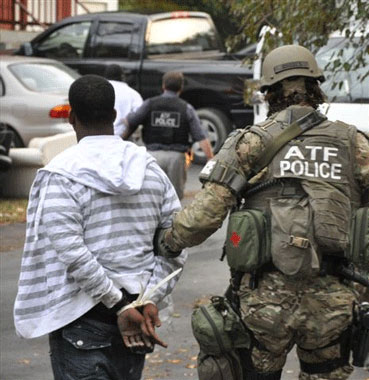 With the rash of armed robberies of cell phone stores and pawnshops in the Houston area, Alex Johny is assigned to a task force to catch the criminals behind those serial attacks.
With the rash of armed robberies of cell phone stores and pawnshops in the Houston area, Alex Johny is assigned to a task force to catch the criminals behind those serial attacks.
Johny—a special agent with the Bureau of Alcohol, Tobacco, Firearms and Explosives—has been assigned to the gun group for the last six years, targeting convicted felons, illegal immigrants, gangs and other organized groups with firearms. Using confidential informants or undercover buys, Johny investigates guns used in crimes or the individuals that cannot legally possess them.
“Unlike other crimes, like drugs, it is not illegal for everyone to possess guns,” Johny said. “In fact, it is a legal transaction for most people. But it is illegal if you are a convicted felon, if you are an illegal immigrant, if you are dishonorably discharged from the military, or otherwise prohibited.”
He will talk about those experiences on Wednesday (Sept. 24), from 2–3 p.m., as part of the College of Criminal Justice’s Real Talk w/CJ series, in the Criminal Justice Center’s Hazel B. Kerper Courtroom.
Johny investigates cases by doing his homework, trying to identify perpetrators by working with confidential informants, street names or nicknames. Once he identifies a suspect, he has to verify that it is, in fact, illegal for that individual to possess a gun.
Once an identification is made and a felony conviction is confirmed, ATF generally sets up a “buy” on the streets.
“Even when you have a plan, you have to adapt and overcome the situation,” said Johny. “You have to use your instincts.”
While Johny concentrates on guns, the mission of the ATF goes well beyond firearms. The federal agency is charged with protecting communities from violent criminals and organizations involved in the use and trafficking of illegal fireworks; the illegal use and storage of explosives; acts of arson, bombing or domestic terrorism; and the illegal diversion of alcohol and tobacco products.
Before joining ATF, Johny worked as a parole officer in Harris County for the Texas Department of Criminal Justice, Parole Division, and as a patrol officer for the Houston Police Department.
With a caseload of 60-70 defendants, the parole office taught him time management, priorities and organization skills. He credits HPD with teaching him to be a police officer.
Law Prof To Discuss ‘Genetic Privacy’ At Woodlands Center
In a time when privacy may seem to be fading away because of the Internet, Sam Houston State University—The Woodlands Center will work to show members of the Bearkat and The Woodlands-area community how the federal government has worked to protect your “genetic” privacy.
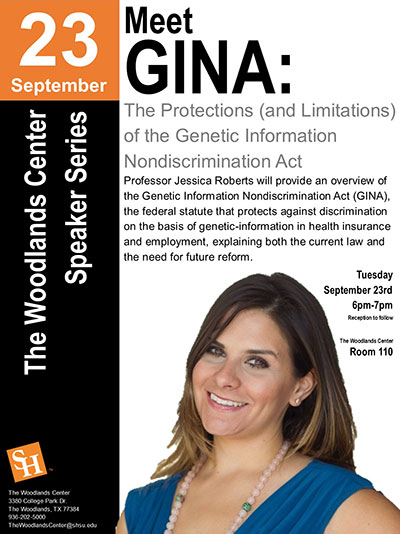 University of Houston Law Center assistant professor Jessica Roberts will discuss on Tuesday (Sept. 23) the Genetic Information Nondiscrimination Act, passed by Congress in 2008 to protect against discrimination on the basis of genetic-information in health insurance and employment.
University of Houston Law Center assistant professor Jessica Roberts will discuss on Tuesday (Sept. 23) the Genetic Information Nondiscrimination Act, passed by Congress in 2008 to protect against discrimination on the basis of genetic-information in health insurance and employment.
Her presentation, which will begin at 6 p.m. at The Woodlands Center Auditorium, in Room 110, will explain both the current law and the need for future reform.
“Roberts’s presentation will provide the audience with a unique perspective on a range of privacy issues many have never considered,” said Glenn Sanford, SHSU professor of philosophy.
“With the rapid growth of medical genetics, it is essential that we proactively consider how genetic information will be used in medicine, employment, parenting, and other aspects of our society.”
At UH, Roberts teaches health law, disabilities and the law, and genetics and the law.
She attended the University of Southern California and Yale Law School. She also held prestigious clerkships with the United States Court of Appeals, Fourth Circuit and the Texas Supreme Court.
Roberts has received national recognition for her work on discrimination and the special problems associated with regulating genetic research and genetic information.
“Roberts’s experience uniquely qualifies her to speak to us about her research with genetics in the law/discrimination and inform us about the severity of the issue,” said Janet Mullings, executive director of SHSU-The Woodlands Center.
The event, part of The Woodlands Center Speaker Series, is among several programs offered to enrich the TWC academic experience, according to Mullings.
Roberts’s talk, which is open to the public, will be followed by a small reception.
SHSU-The Woodlands Center is located at 3380 College Park Drive.
For more information, contact Jordan Story, TWC enrollment management counselor, at 936.202.5000 or jordanstory@shsu.edu.
Career Expo To Offer More Than 100 Job Choices
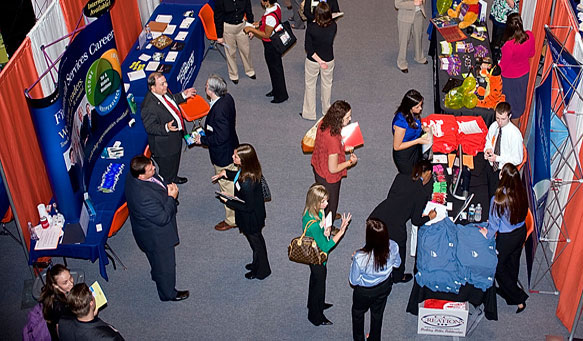 Sam Houston State University’s Career Services will provide students and alumni who are ready to enter the workforce or a graduate program with the opportunity to meet with more than 120 organizations during the Career Expo and Graduate/Professional School Fair on Wednesday (Sept. 24).
Sam Houston State University’s Career Services will provide students and alumni who are ready to enter the workforce or a graduate program with the opportunity to meet with more than 120 organizations during the Career Expo and Graduate/Professional School Fair on Wednesday (Sept. 24).
Representatives from those organizations will be on hand to discuss full-time jobs, internships, and graduate and professional school admissions from 10 a.m. to 2 p.m. in the Bernard G. Johnson Coliseum.
“The Career Expo and Graduate/Professional School Fair is an excellent opportunity for students to network and gather information about current job or internship opportunities with state and federal agencies and not-for-profit and for-profit organizations,” said Mitch Parker, Career Services marketing and events coordinator. “I encourage everyone attending to dress professionally and to bring multiple copies of your résumé.”
Among the companies that will be represented include Dallas and Houston police departments; Chevron Phillips Chemical Company, LP; KBTX-TV; the Department of Justice’s Drug Enforcement Administration; Epic Health Services; Nucor Steel; Peace Corps; Pulte Group; Target Corporation; Walgreens; Way Engineering, Ltd.; and Texas departments of banking, protective and regulatory services, and public safety.
In addition, graduate and professional programs from SHSU; Baylor University; Texas A&M University; Rice University; Texas Chiropractic College; and the universities of North Texas, Houston-Clear Lake, St. Thomas and Texas, among others, will be on hand to talk about potential post-graduate educational opportunities available to students.
“This is one of our biggest job fairs of the year designed to serve students and alumni of all majors,” Parker said.
Students who are registered on Jobs for Kats can get a jumpstart to finding a job or internship by logging on, at JobsforKats.com, to find to find a complete list of participating agencies as well as the positions for which they are recruiting.
For more information, contact Career Services at 936.294.1713.
Workshop To Address Financial Aid ‘Mysteries’
The Student Money Management Center will work to “unravel the mystery of financial aid” with a presentation on Wednesday (Sept. 24) that will address everything students need to know about keeping financial aid to a minimum.
The workshop, led by SMMC director Patsy Collins, will begin at 6 p.m. in the Lowman Student Center Ballroom.
“Unraveling the Mystery of Financial Aid” will address the various types of federal, state, and alternative aid, including grants, loans, work-study, and scholarships.
“For many students, financial aid is a significant component in their budget-planning to help pay for their college education,” Collins said. “Students will learn the calculation to determine if they are eligible for need-based aid, and we will discuss the regulatory requirements necessary for the students to maintain eligibility to receive these various types of financial aid.
“The SMMC wants to ensure that students know pertinent information regarding the academic performance level necessary to receive financial aid in the future,” she said. “If financial aid funding is a factor in the students’ budget, then they need to be aware of the financial ramifications of not making satisfactory academic progress as defined by the United State Department of Education.”
The idea for this type of workshop developed when Collins was asked by residence hall advisers to address with freshmen financial issues such as analyzing financial aid packages, explaining the different forms of aid available, and budgeting financial aid refunds.
“The RAs thought that many freshmen don’t have a handle on their financial aid; their perception was that the parents of the freshmen processed the FAFSA and student aid without including the student in the loop, so the freshman student does not have appropriate information about the various types of financial aid, how it applies to their fee statement or how to budget the refund,” Collins said.
Financial Aid office representatives also will answer questions at the end of the program.
Free pizza and drinks will be provided to students who attend. Students who attend at least three events also will be entered into a drawing for one of two $400 scholarships.
For more information, visit shsu.edu/~smmc or call 936.294.2600.
Physicist’s Book Excerpt Published In Discover Magazine
A new book by Sam Houston State University physics professor Reneé James has caught the attention of popular science magazine Discover.
An excerpt from the book “Science Unshackled: How Obscure, Abstract, Seemingly Useless Scientific Research Turned Out to Be the Basis for Modern Life” appears in the Aug. 29 edition of the magazine.
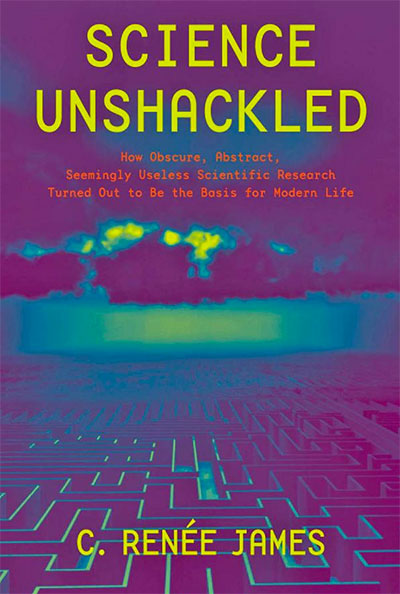 The excerpt, entitled "Like GPS? Thank Relativity," describes an early experiment to test Einstein's relativity theory that involved measurements with a number of highly accurate atomic clocks dispersed around the world via jet travel.
The excerpt, entitled "Like GPS? Thank Relativity," describes an early experiment to test Einstein's relativity theory that involved measurements with a number of highly accurate atomic clocks dispersed around the world via jet travel.
The tiny differences in the various clocks' timekeeping demonstrated the reality of relativity in a way that had implications for the development of today's accurate GPS systems.
James’s book was released in August by John Hopkins University Press.
It explores the “seemingly useless” world of pure science— where one thing leads to another in ways that resulted in major, life-changing advancements, according to James.
Such advances include how the exploration of natural phenomena including curved space-time, poisonous cone snails, exploding black holes, and the precise chemical makeup of the sun have led unexpectedly to WiFi, GPS, genetic sequencing, pain medications, and cancer treatments.
The publication of the excerpt in Discover came as a surprise to James, who credits her editor and publicist for spreading the word about her book to popular science outlets around the globe.
"I've written for Astronomy a number of times, but never Discover,” she said. “In fact, this book really got its start in Astronomy in May 2012, when they accepted an abbreviated, astronomy-only piece along the same lines. Then it expanded into the full book idea that Johns Hopkins University Press agreed to publish.”
The Discover article is available online here.
The full-length book can be found in the JHU Press catalog and at online retailers. The e-book will be released in early October.
Study Evaluates Effective GIS Use In Policing
Police agencies are using Geographic Information Systems for mapping crime, identifying crime “hot spots,” assigning officers, and profiling offenders, but little research has been done about the effectiveness of the technology in curbing crime, according to a study at Sam Houston State University.
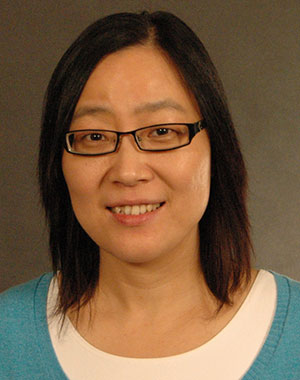 |
Yan Zhang |
“This review provides a reality check on the current status of GIS assessment in policing and the findings are not positive,” said Yan Zhang, professor and co-author of “Geographic Information System Effects on Policing Efficacy: An Evaluation of Empirical Assessments.”
“Published accounts of applications in policing suggest a significant role in crime analysis and strategic deployment,” Zhang said. “Nonetheless, there is a total lack of independent evaluation of GIS effect in policing organizations.”
According to a 2001 survey by the National Institute of Justice, 62 percent of police departments with more than 100 officers use GIS systems. Collectively, the technology has been credited with reducing crime, decreasing residential burglaries, tracking parolees and serious habitual offenders, and identifying “hot spots” with high concentrations of crime.
Many departments have developed computerized statistics, or CompStat systems, to help manage the decision-making process. The system assists with instant crime analysis, deployment techniques, active enforcement of trivial crimes, monitoring of emerging patterns, and accountability programs for law enforcement managers.
GIS also is used to create geographical profiling of offenders, an investigative method that allows police to identify locations of connected crimes to help determine where an offender may live, particularly in serial cases.
Current studies indicates that GIS is used mainly to aid in the design of policing strategies and/or to evaluate the decision-making processes at law enforcement agencies.
“There is a near total lack of independent evaluations of GIS effect in police organizations,” said Zhang. “Since GIS represents a significant element of both strategic and tactical decision making for law enforcement agencies, purposeful, focused and relevant evaluations would contribute to maximizing GIS efficacy.”
The study, co-authored by criminal justice professors Larry Hoover and Jihong (Solomon) Zhao, was published by the International Journal of Applied Geospatial Research and is available online here.
ROTC Remembers Fallen With Sept. 11 Tribute
Cadets from Sam Houston State University’s Army ROTC Bearkat Battalion had a mission on Sept. 11: remember those who died, while honoring those currently serving the war that resulted from that attack.
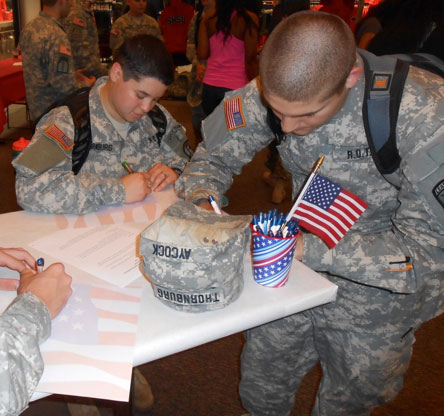 |
| An Army ROTC cadet writes a letter to an active serviceperson for "National Day of Service and Remembrance" on the SHSU campus on Sept. 11. —Submitted photo |
In a joint effort along with the SHSU Center for Leadership and Service and the Veterans Resource Center, cadets hosted a “National Day of Service and Remembrance” service project on that day, providing students an outlet to write letters to active military serving overseas in Afghanistan.
The letters written during this event will be given to Grammy’s Cookie Convoy from Montgomery County, an agency that bakes homemade cookies and sends them to troops with letters of support written by volunteers.
The ROTC department aided the Center for Leadership and Service and the Veterans Resource Center in greeting SHSU students as they arrived at the Lowman Student Center Atrium.
They also staffed the supply table where students picked up paper and pens for writing and the drop-off table where the letters were collected.
Cadets from Bearkat Battalion and other students of all ages and ethnicity, both veteran and non-military, participated in the letter writing project in support of the soldiers, airmen, sailors, and marines currently deployed in combat zones, according to cadet Seth Vance.
“Anyone who has been in the military and has served a tour in a combat zone knows that letters and care packages are a welcoming sight after returning from a 12-hour patrol in the blistering heat,” he said. “These care packages filled with delicious cookies and encouraging letters from the students of Sam Houston State University will be a breath of fresh air and a source of motivation to help build morale for service members currently serving in harm’s way, men and women who give and sacrifice so much in support of our nation.
“The Bearkat Battalion at Sam Houston State University is honored to have participated with Center for Leadership and Service and the Veterans Resource Center in hosting this event and looks forward to participating in more service projects in the future,” he said.
Today@Sam Seeks Fall Calendar Info
The university Communications Office is now collecting information on campus events for its fall calendar pages.
Departmental calendars or events can be sent to today@sam.edu or jenniferg@shsu.edu or faxed to 294.1834. Please include the date, location and time of the event, as well as a brief description and a contact person.
Information collected for the Today@Sam calendar pages, at shsu.edu/calendars, is used by various media outlets, as well as the Communications Office for news stories and releases.
All information, including story ideas and update items for Today@Sam, should be sent a minimum of a week in advance of the event in order to make necessary contacts and write a story.
To see a full list of the Today@Sam submission guidelines, or to access submission forms for news or feature stories, calendar submissions, or hometown releases, visit shsu.edu/guidelines.html.
For more information, call 936.294.1836.
Submit Update Items Here
In order to assist members of the Sam Houston State University community in publicizing events, the SHSU Communications Office (Today@Sam) is now requesting that students, faculty and staff submit information about events, accomplishments or ideas for feature stories online.
Submission criteria and guidelines, including deadlines, have now been placed online, at shsu.edu/guidelines.html. This information is also accessible through the “Submissions” link in the right-hand navigation on Today@Sam.
From there, those submitting ideas can access forms that will allow them to provide detailed information about their idea, as well as attach event calendars, vitas/resumes or photos, depending on the type of submission.
Ideas submitted to the SHSU Communications Office are directly utilized in several ways: as news stories, “slider” or SHSU home page stories, hometown releases, and on the Today@Sam calendar.
If your submission qualifies for distribution, we will either contact you for more detailed information, or we will edit the information using SHSU/journalistic style and forward the final release to the appropriate media.
All information is verified before release, so please provide complete, accurate and timely information. Please type all responses in appropriate upper and lower cases.
For more information, contact the Communications Office at 936.294.1836 or today@sam.edu.
- END -
This page maintained by SHSU's Communications Office
Associate Director: Julia May
Manager: Jennifer Gauntt
Located in the 115 Administration Building
Telephone: 936.294.1836; Fax: 936.294.1834
Please send comments, corrections, news tips to Today@Sam.edu.

 SamWeb
SamWeb My Sam
My Sam E-mail
E-mail

